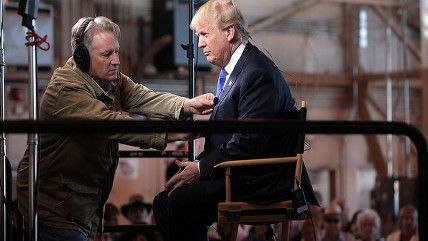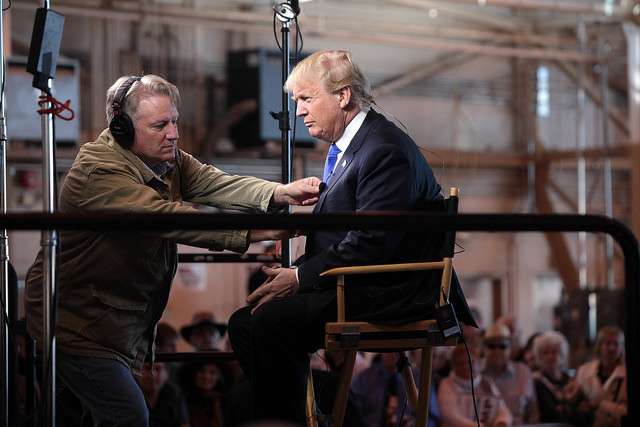Why Trump's War on the Media Matters
Most presidents distrust the news media. Trump wants to undermine it as an institution.


Throughout his presidential campaign Donald Trump complained extensively about biased news coverage, singled out individual journalists for criticism, challenged the very foundations of freedom of the press, and called for loosening of the libel laws.
Now as president-elect, Trump's war on the media continues. At a recent meeting with top television executives, for example, Trump berated the networks for their "outrageous" and "dishonest" coverage and, according to a source, he told CNN chief Jeff Zucker that "everyone at the network is a liar and you should be ashamed." The same day, rather than holding a press conference where journalists might ask him difficult or uncomfortable questions, Trump instead released a YouTube video updating the public on the White House transition, which he said had proceeded "very smoothly, efficiently, and effectively."
As president, Trump's mistrust of the media will certainly make life difficult for journalists trying to provide the public with a clear view of presidential decision-making. To be clear, presidential animosity toward the press is nothing new. All presidents get frustrated by what they view as an unsympathetic press corps that mangles and reinterprets their words for the news, making it difficult to communicate clearly to the American public.
As a result, presidents have long sought to reduce the number of press conferences they hold while increasing the amount of communication they do through other means. The emergence of social media has simply allowed Trump to take that trend to the next level. Though distasteful and dysfunctional, the Republic won't fall just because journalists have to watch YouTube like the rest of us to learn what Trump's been up to.
But the deeper danger is that Trump's war will undermine the media as an effective forum for debate and deliberation. By avoiding engagement with journalists and by stifling media critics through public shaming and other strong-arm tactics, Trump will weaken the ability of the press to play the role of watchdog and critic envisioned by the Founders and embodied in the First Amendment. By attacking the media's objectivity and credibility, the Trump administration will weaken what's left of public confidence in the public sphere and, by extension, in the entire project of democratic self-governance.
Trump already enjoys a disturbing level of support for his assault on the news media. In a post-election Pew survey, for example, just 22 percent of Americans gave the press either an A or B for its campaign coverage, with 59 percent giving it a D or F. A September 2016 Gallup poll found that just 32 percent of the public trust the press a fair amount or a great deal to report news "fully, accurately, and fairly," the lowest figure since Gallup first asked the question in 1976.
Nor is the timing of Trump's war on the media an accident. The media have become an arena of conflict in the partisan battles of an increasingly polarized political system. To those who believe that the media exhibits a liberal bias, Trump is a welcome corrective. Not surprisingly then, the recent collapse of trust has been driven primarily by Republicans, just 14 percent of whom now believe the mass mews media deserves even a fair amount of trust compared to 30 percent of independents and 51 percent of Democrats. A related trend is the increasing Balkanization of news audiences around competing news sources. As a 2014 Pew study showed, for example, 47 percent of "consistent conservatives" name Fox News as their primary (and trusted) source of news about politics, while almost completely avoiding other major news outlets like The New York Times.
Even more frightening is the fact that the trend appears most pronounced among younger Americans, who tend to be somewhat more liberal than their parents. In 2016 just 26 percent of those under the age of 50 trusted the news media compared to 38 percent of those age 50 or older. Nor does the advent of the social media help. Just 34 percent of American adults who use the web trust the information they get from social media sources.
How Trump will deal with the media seems clear. Less clear, however, is how the media will respond to Trump. The past 30 years or so do not provide much reason for optimism. The news industry has been pummeled by the fragmentation of the news audience and the emergence of the Internet. In the difficult economic environment they face, news organizations have shown little stomach for increasing hard news budgets or supporting much in the way of investigative journalism.
Instead, a good deal of what passes for American journalism today is simply information recycled straight from government sources. There are exceptions, of course, as well as newer, non-traditional sources of news and opinion that provide alternative narratives to the mainstream media accounts. Most encouraging, perhaps, are the emerging signs that Trump's election may lead to a reinvigorated sense of duty on the part of journalists, news organizations, and NGOs. Whether these initial responses add up to an effective counterpoint to Trump's bully pulpit, however, remains to be seen.
Trevor Thrall is a senior fellow for the Cato Institute's Defense and Foreign Policy Department.


Show Comments (609)